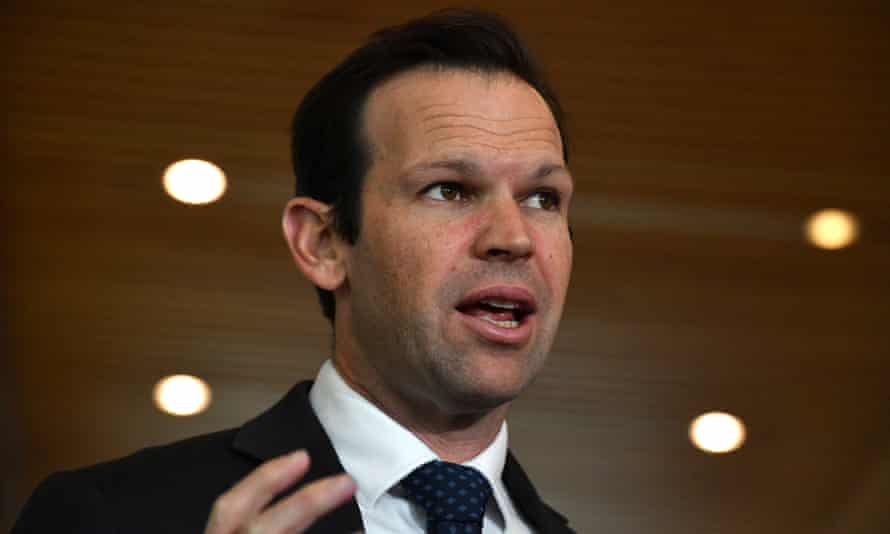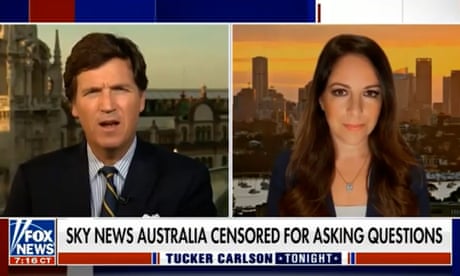Extract from The Guardian
But at some point, the cohort of Australians willing to be vaccinated will top out, and the prime minister will need to turn the vaccine-hesitant into conscripts.

Nationals senator Matt Canavan has claimed the economic price paid for saving lives during the Covid-19 pandemic is ‘unjustifiable’.
Last modified on Sat 7 Aug 2021 06.01 AEST
If you’ve been watching proceedings in parliament this week, you’ll have witnessed a strange, constrained, slightly testy session. The crew of parliamentarians that have made it to Canberra have their minds very much on events at home.
For obvious and entirely legitimate reasons, much of the focus during the pandemic has been trained on the major cities as residents have battled various outbreaks and lockdowns. The reporting road less travelled is what’s happening out in the regions. That picture is dynamic and interesting.
I made some calls to government MPs this week to try to get a sense of what the story might be. Politicians report they are copping it from both sides – from constituents who support the public health response, but fear the government has buggered up the vaccination rollout. MPs are also copping it from constituents who think the pandemic is a beat-up or a conspiracy of some kind, and from their traditional supporters who think centre-right governments should not be shuttering businesses and spending like there is no tomorrow.

For much of the crisis, Covid has been a hypothetical event in Australia’s regions. In places like Queensland, conditions were relatively stable over the summer, so businesses limped on despite the absence of international tourists. But then winter brought the Delta outbreak, and an uncomfortable sense of encroachment, if not outright threat. Delta also arrived at a time when people were fatigued psychologically by living in a crisis without an obvious endpoint. MPs say frustration on the ground at the moment is palpable.
As well as the backlash from constituents – from both the Covid-terrified and the Covid-sceptical – Coalition MPs report growing hostility from the party membership about the public health restrictions and the scale of the fiscal response.
It is possible that some of these rumblings are being reinforced by the Fox News mini-me culture warriors on Sky After Dark: the folks who live to roil. If you’ve been following the news, you will know that Sky had its wings clipped recently when YouTube took action under its Covid-19 medical misinformation policies to “prevent the spread of Covid-19 misinformation that could cause real-world harm”.
The journalist and academic Margaret Simons wrote a thoughtful piece this week arguing the influence of Sky was likely overstated in Australia, given the content wasn’t “widely trusted” and nocturnal ranters largely preached to the converted.
But you wouldn’t want to be sanguine (and Simons isn’t) about the persistent creep of a post-truth machine at a time when societal tensions are heightened by prolonged pandemic anxiety. We’ve all witnessed the havoc the Foxification of the United States has brought to that democracy. No sensible person wants that cultural corrosion here.
While I won’t pretend to assess the broader cultural impact of the Australian offshoot, I can report that in the ecosystem I inhabit, politics, Sky has some influence with the Coalition’s base, certainly the active base who determine preselections. That can make life uncomfortable for Liberal and National parliamentarians who don’t maintain an Alan Jones shrine in their offices.
George Christensen is active in anti-lockdown activism, as is Gerard Rennick. After YouTube moved against Sky, Rennick complained on his Facebook page of “conflicts of interest between foreign-owned pharmaceuticals and foreign-owned social media”. Rennick also has posts on Facebook critical of the vaccine manufacturers.
Some government MPs fear the tectonic plates have shifted
In the United States, among Fox News/Conservative Political Action Conference conservatives, the Washington Post reports vaccine hesitancy has morphed now into “outright vaccine hostility” – although the Delta outbreak has prompted something of a tonal shift from some of the more high profile ranters.
US reports about the impact of political polarisation on the rollout piqued my curiosity about what might be going on here, so I asked John Remington, who handles our Guardian Essential poll, to send me some guidance. He says partisan affinity doesn’t seem to be a factor in Australian voter attitudes about vaccination. Here, vaccination uptake lines up with age – older voters are more likely to have been inoculated because they were the initial priority group, and older voters are more likely to be Coalition voters.
Remington says our poll shows resistance here is highest among One Nation voters, with 38% in that cohort declaring they will never be vaccinated compared with 9% of everyone else. It’s a similar story with anti-lockdown protests. While government MPs in the regions report growing hostility about restrictions from their rusted-on base, 72% of self-identified Coalition voters in our latest poll say they oppose the protests. Support for taking to the streets is highest (31%) among the protest vote cohort, which situates us again in One Nation territory.
These insights, along with the base pressure Coalition MPs are reporting, provides some context about the current signalling by LNP populists in Queensland – people who want One Nation voters to remain Coalition adjacent.
We can illustrate these dynamics with a cameo from the last election. In Christensen’s seat of Dawson, One Nation grabbed 13% of the vote in 2019, and Labor’s vote plunged more than 12%. Christensen’s personal vote hardly moved, but in two-party preferred terms he got the largest positive swing in the country.
In 2019, a revolt from Labor’s blue collar base kept Bill Shorten out of government. A chunk of Labor and Labor-adjacent voters switched to Morrison because they felt estranged from the cultural identity the ALP was projecting in that contest.
Now, some government MPs fear the tectonic plates have shifted and the Coalition is rendered vulnerable by a similar uprising from within their own heartland.
It’s obviously a dynamic environment. Events shape sentiment. But the sum of all these parts explains why Scott Morrison acts as if he is orienteering in a minefield when he is asked periodically whether or not he supports the latest buffoonery from within his own ranks about ivermectin, or the evils of masks, or lockdowns, or vaccine passports.
Morrison responds to these queries with characteristic elasticity. He declares himself both for and against the buffoonery. He doesn’t personally agree with whatever statement contradicting public health advice is being expressed by a member of his government, but he is absolutely for free speech.
In political terms, Morrison is deploying weasel words, plain and simple.
But in public health terms, the situation is actually more complex. Rather than shutting the backlash down hard, the prime minister does need to maintain a line of communication with people in the community whose vaccine hesitancy stems from a deep suspicion of government systems and their motives. He needs to try to persuade those people to trust in the science that can save their lives.
Modelling from the Doherty Institute this week reinforces our present reality. We are going to be battling the coronavirus for an extended period of time. We are not going to eradicate this virus. Public health measures are here for the long haul, and high vaccination rates across the population are the best defence we have.
At a certain point, the cohort of Australians willing to be vaccinated will top out, and then the challenge will be to turn the vaccine-hesitant into conscripts.
At that juncture, Morrison will need to consider how best to reach the people some of his MPs are currently courting through reinforcing and validating their estrangement and fear.
Of course, reinforcing and validating people’s estrangement and fear will not make Australians safe from a virus that can kill them. Morrison might just have to exhibit some leadership and straight talking rather than swimming noiselessly across a political rip.
No comments:
Post a Comment